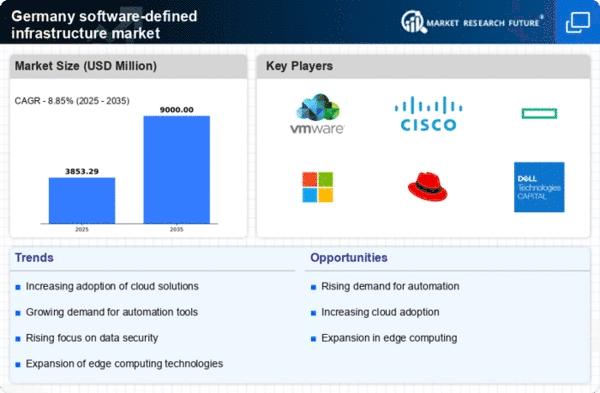Rising Demand for Scalability
The software defined-infrastructure market in Germany is experiencing a notable increase in demand for scalable solutions. As organizations expand their operations, the need for flexible infrastructure that can grow with business requirements becomes paramount. This trend is particularly evident in sectors such as finance and telecommunications, where rapid changes necessitate adaptable systems. According to recent data, approximately 65% of German enterprises are prioritizing scalability in their IT investments. This shift is driving innovation within the software defined-infrastructure market, as vendors strive to offer solutions that can seamlessly integrate with existing systems while providing the necessary scalability. The ability to dynamically allocate resources not only enhances operational efficiency but also reduces costs, making it a critical driver for growth in the market.
Shift Towards Hybrid IT Environments
The transition to hybrid IT environments is a significant driver in the software defined-infrastructure market in Germany. Organizations are increasingly adopting a mix of on-premises and cloud-based solutions to optimize their IT strategies. This hybrid approach allows for greater flexibility and resource allocation, catering to diverse business needs. Recent surveys indicate that over 60% of German enterprises are implementing hybrid IT models to enhance operational efficiency. The software defined-infrastructure market is responding to this trend by offering solutions that facilitate seamless integration between various environments, thereby enabling organizations to leverage the benefits of both cloud and on-premises infrastructures. This shift is likely to continue shaping the market landscape in the coming years.
Cost Efficiency through Virtualization
Cost efficiency remains a pivotal driver in the software defined-infrastructure market in Germany. Organizations are increasingly turning to virtualization technologies to optimize their IT expenditures. By consolidating hardware resources and utilizing software-defined solutions, companies can significantly reduce operational costs. Recent studies indicate that businesses leveraging software defined-infrastructure can achieve up to 30% savings on their IT budgets. This financial incentive is compelling, particularly for small and medium-sized enterprises (SMEs) that may have limited resources. The ability to deploy and manage infrastructure through software not only streamlines operations but also allows for better allocation of financial resources, thereby fostering growth and innovation within the market.
Regulatory Compliance and Data Sovereignty
In Germany, regulatory compliance and data sovereignty are increasingly influencing the software defined-infrastructure market. With stringent data protection laws such as the General Data Protection Regulation (GDPR), organizations are compelled to adopt infrastructure solutions that ensure compliance. This has led to a surge in demand for software defined-infrastructure that can provide robust security features and data management capabilities. Approximately 70% of German companies report that compliance with data regulations is a top priority in their IT strategy. As a result, vendors in the software defined-infrastructure market are focusing on developing solutions that not only meet regulatory requirements but also enhance data security and privacy, thereby driving market growth.
Focus on Enhanced Performance and Reliability
Performance and reliability are critical factors driving the software defined-infrastructure market in Germany. As businesses increasingly rely on digital solutions, the demand for high-performance infrastructure that can support complex applications is growing. Organizations are seeking solutions that not only enhance performance but also ensure system reliability. Recent data suggests that approximately 75% of German companies consider performance optimization a key factor in their IT infrastructure decisions. This focus on performance is prompting vendors in the software defined-infrastructure market to innovate and provide solutions that can deliver superior speed and reliability, thereby meeting the evolving needs of businesses in a competitive landscape.
















